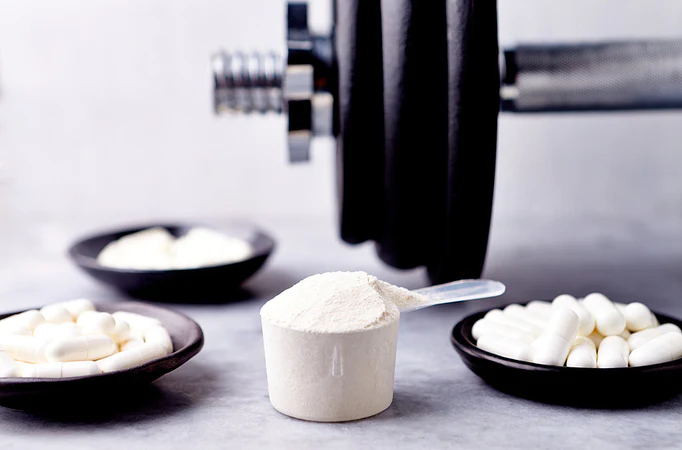
Researchers looked at the effects of creatine nitrate and caffeine separately and in combination on resistance-trained athletes’ exercise performance and cognitive function in a recent study that was published in Nutrients.
Background
Two dietary supplements that have shown promise in improving training and exercise performance are caffeine and creatine. Coffee increases muscular endurance, strength, and anaerobic performance by binding to the A2A subtype of adenosine receptors.
Moreover, it enhances neural excitability and reduces pain. During anaerobic exercise, creatine takes the place of adenosine triphosphate (ATP), increasing training volume and short-term power output. It’s unclear, though, how caffeine and creatine interact.
Regarding the study
Researchers at Jacksonville State University examined the effects of a seven-day high-dose caffeine and creatine nitrate regimen, as well as their combination, on severe intermittent exercise performance and mental attention in resistance-trained athletes. The study was a double-blind, randomized, crossover, placebo-controlled trial.
The individuals on the team ranged in age from 18 to 40, had at least two years of experience with multi-joint resistance training, had no prior history of metabolic disorders (such as diabetes, cardiovascular disease, thyroid issues, or arrhythmia), and did not take prescription drugs.
They did not include smokers, people with a body mass index (BMI) of less than 18.5 or greater than 24.9, people who were allergic to natural stimulants like coffee, or people who consumed more than 12 alcoholic beverages per week.
The study was carried out in controlled environments by the researchers, who instituted a 12-hour fast and a 48-hour break from physical activity, coffee, and specific medications and supplements.
They gave creatine nitrate (CN: (4 g creatine; 1 g nitrate), 5.0 g/d plus 0.7 g/d maltodextrin), caffeine (CAF: 400 mg/d + 5 g/d maltodextrin), or a combination of the two to 12 male athletes who had trained in resistance.
The participants finished a Wingate anaerobic power test as well as normal resistance workouts (bench and leg press at 70% 1RM). Forty-five minutes after the test, the researchers evaluated their cardiovascular reactions and cognitive function.
The Visual Analog Scale (VAS) was used to assess individuals’ performance readiness after the cognitive function test. In order to evaluate the participants’ coffee consumption, sleep quality, and any potential negative consequences, they also filled out extensive questionnaires.
Creatine kinase (CK), lactate dehydrogenase (LDH), alkaline phosphatase (ALP), aspartate aminotransferase (AST), and alanine aminotransferase (ALT) were among the enzymes that were tested for safety in blood samples that the athletes supplied.
To evaluate total cholesterol (TC), high-density lipoproteins (HDL), low-density lipoproteins (LDL), very-low-density lipoproteins (VLDL), and triglycerides (TG), the researchers carried out a comprehensive lipid profile.
Participants completed four sets of three-day food diaries to evaluate their dietary consumption. The Stroop Word-Color Test was used to assess the effects of nutritional supplements on attention, processing speed, and cognitive flexibility.
Outcomes
While having minimal effect on short-term exercise performance, a combination therapy of caffeine and creatine nitrate significantly improved cognitive function, particularly in cognitive interference tests.
A substantial interaction effect between the two supplements was found using the Stroop Word-Color Interference test, where the CO treatment outperformed the CN treatment in terms of mean score. The results show that combination supplementation has a major impact on cognitive function.
Nevertheless, none of the supplement kinds demonstrated clear performance gains in all or the majority of the outcomes, suggesting a complex relationship between creatine and caffeine.
Following CO supplementation, the observed increases from baseline in the Stroop Color and Word-Color interference tests are in line with earlier studies verifying the cognitive benefits of creatine.
The enhanced cognitive performance observed in the CO group could suggest a synergistic effect of creatine in conjunction with CAF, perhaps amplifying cognitive benefits by means of increased activation of the prefrontal cortex.
Additionally, the researchers discovered that the effects of creatine supplementation varied depending on the type of activity, especially endurance sports and scenarios in which an excess of body mass could be detrimental to performance.
The results of the Wingate test showed that performance was constant across indicators including total work, fatigue index, mean power, minimum power, and peak power, suggesting that the benefits of caffeine on anaerobic performance are not as strong as previously thought.
The findings reinforces the need for additional research to go through the multiple links influencing exercise outcomes and advocates for a cautious approach to declaring CN and CAF’s effectiveness as performance enhancers.
The fact that heart rate and blood pressure did not significantly alter before or after exercise lends credence to the short-term cardiovascular safety of these supplements.
Wind-Up
According to the study, taking caffeine and creatine nitrate combined can improve resistance-trained athletes’ cognitive function for up to seven days without having a negative impact. Nevertheless, there was no discernible increase in exercise performance with these supplements.
The study affirms the short-term safety of these supplements and suggests more research on their effects on long-term cognitive and physical performance across a range of demographics.
The effects of these supplements on hormone responses, force production, muscle growth, intramuscular communication networks, and neuromuscular efficiency may be better understood through longitudinal studies. In order to expand the findings to encompass gender-diverse groups, future research should include female athletes.










